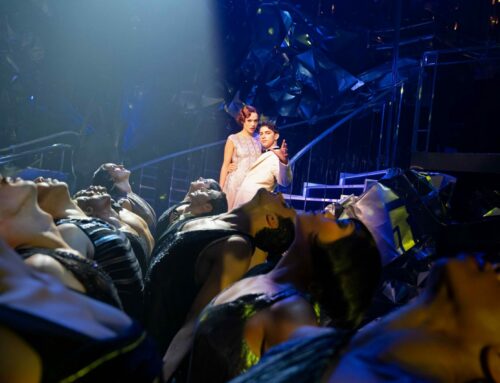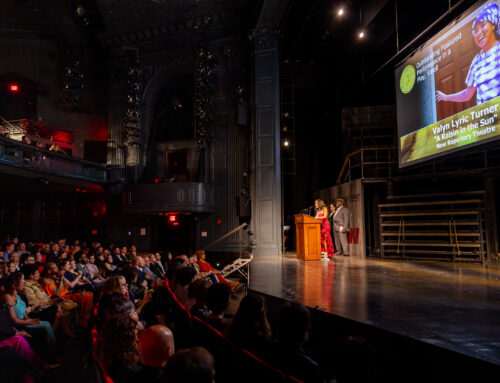What could be more fitting for this summer’s FREE annual Commonwealth Shakespeare production on the common, than THE TEMPEST? In a season of storms: climatic, pandemic, and politic, and their cross currents: moral ambiguity, familial friction, and racial strife, the brilliant John Douglas Thompson and company deliver a masterpiece of rough magic and earthy wisdom in the most relatable “Tempest” I’ve ever seen.
Under a clear Boston sky, a royal Neapolitan cohort arrived onstage, shipwrecked on the shores of a magical island and the cusp of a reckoning. Aboard the ship is Alonso the King of Naples (Richard Noble ), his son Prince Ferdinand (Michael Underhill), the king’s imminently murderous brother Sebastian (Maurice Emmanuel Parent), and Antonio (Remo Airaldi) who has stolen the Dukedom from his brother Prospero (Elliot Norton Award winner John Douglas Thompson/”Mare of Easttown”) who is the rightful Duke of Milan and now ruler of this island. Prospero who always had more of a mind for witchcraft than statecraft and who was cast into exile with his daughter Miranda (Nora Eschenheimer) by his ambitious brother, now has them all in his thrall. He is omnipotent on this magical island where all are subject to his higher powers, including Ariel (John Lam) an airy spirit who must do his bidding to earn his freedom, and the slave Caliban (Nael Nacer) an ungainly amalgam of the primitive and the civilized. Aren’t we all.
Shakespeare’s intentions and the moral universe of the play are ambiguous. In the world of “The Tempest,” the Bard in the person of Prospero, seems to be examining his own power as a creator, as well as the complexity of the real world he inhabits and those he creates; in both worlds good and bad co-exist, power shifts randomly, and tables turn at the whim of a ruler who himself has been betrayed. Prospero, once sold down the river, is now at the helm as a would-be god who holds everyone’s destinies in his hands, but whose unearthly powers may find their wisest expression in divine mercy and human compassion.
Within this proto-absurdist world, Steven Maler directs the action on a simple, nimble set where large canvas sails double as a roiling sea. He and composer/sound designer David Rieffel have staged and orchestrated near divine harmonies sung by a heavenly trio: Ekemini Ekpo, Jessica Golden, Marta Rymer. Maler allows the action to subtly gather momentum and find its dramatic and tonal footing in a netherworld that attempts to link sea and sky, the natural and the supernatural, the physical and the spiritual.
The cast is remarkable and supplely straddles this tension. Nael Nacer’s Caliban is one I’ve never seen before, a creature struggling to be more than the sum of his parts, simultaneously loathsome and lovable. Nacer is an extraordinarily warm, versatile actor and a surprisingly limber one. A handstand and his spidery balance on a rolling wheel as well as his initial hilarious deadpan upon realizing the benefits of said wheel, knocked me off my feet. John Lam as Prospero’s indebted spirit servant Ariel is truly inspired casting. As a principal dancer with Boston Ballet, Lam’s Ariel is the ultimate sprite whose performance takes off from the moment he leaps onto the stage; what he lacks in vocal clarity is compensated by copious sincerity and energy. John Kuntz and John Sullivan Jr. as Trinculo and Stephano who mirror the play’s larger themes of patriarchal turnover, were actually funny. It’s rare that I find comfort in Shakespeare’s comic relief.
Nora Eschenheimer’s Miranda is a thing of new female beauty, all muscular optimism, wide-eyed ebullience, and sublime comfort in her own skin matched by a sweet vulnerability. No wonder Ferdinand fell in love at first sight. Michael Underhill is perfect as that goodly handsome prince, matching her innocence with his own noble exuberance, his open heart mirrored by a no-holds-barred delivery of his ardor. Underhill has steadily grown as an actor and has found his own rhythm within Shakespeare’s meter. Together as Miranda and Ferdinand, the two absolutely embody Shakespeare’s hope in a future “brave new world. ” Young and as yet unscathed, the couple spars over chess at the close of the play, as if in rehearsal for the struggles personal and politic that surely lie ahead.
But the tone of the whole production seems to emanate from the pitch of one performance, that of a warm, wise, and for all his magical powers, fully human Prospero as inhabited by John Douglas Thompson. Thompson is one of those actors whose every move is instantly accessible. There is a transparency to his communication that I swear would be understood even if delivered in gibberish. When he is righteously angry at his betrayer, cruel to the “monstrous” Caliban, manipulates the eager-to-please servant Ariel, tests Ferdinand to protect his daughter, and clings to that daughter out fear of losing her, we feel him at every turn to be a man of his times, buffeted by life, engaging his flaws, examining his motives, and reaching for the best in himself in a tumultuous world.
Thompson’s performance is anchored by his extraordinary humanity which redeems everyone in the play and the audience, and reinforces what Shakespeare might be saying here. Prospero in his final soliloquy overthrows his “charms” and breaks his magic wand, the source of his absolute and sometimes corrupting power over everyone on the island. As he throws himself on our mercy and we let him go with our applause to rejoin the larger world, he shows us the power of fully grasping one’s humanity in the real world, recognizing the power we hold over each other, and the ultimate power of compassion to alter our mutual destinies. I was moved to be so reminded in these trying times. THANK YOU Commonwealth Shakespeare Company for bringing us all together, in community, once again. SEE ” THE TEMPEST” through August 8 under the stars!











Leave A Comment
You must be logged in to post a comment.